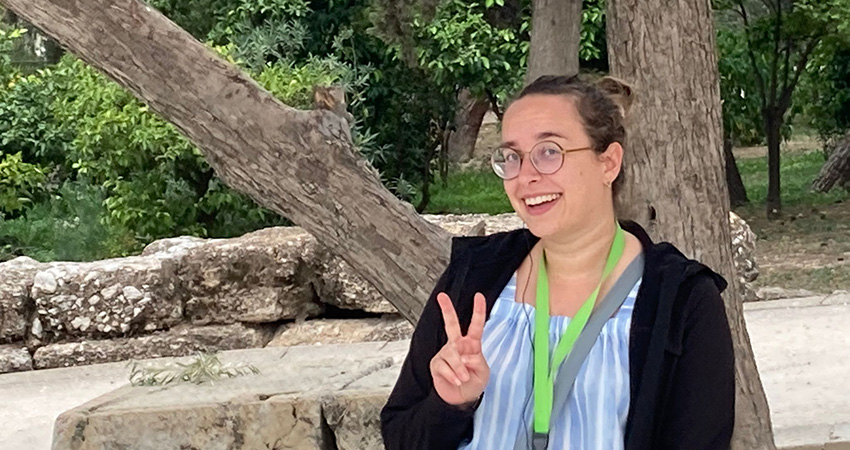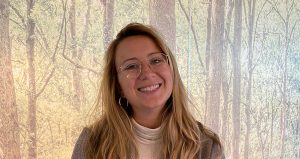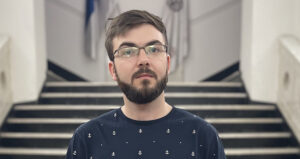Agnieszka: “Antibiotics are now the most concerning contaminants”

-
 Editorial Team
Editorial Team
Share article:
Agnieszka Katarzyna Cuprys is working as a postdoctoral fellow at Norwegian University of Life Sciences (NMBU) in Norway. She is working on contaminants of emerging concern. According to her at this moment antibiotics now need all our attention. Agnieszka is participating in the fourth group of the European Junior Water Programme (EJWP), and is sharing her experiences with Water News Europe.
What and where is your current work position?
“I am currently an MSCA postdoctoral fellow at Norwegian University of Life Sciences (NMBU) in Norway.
What motivates you to participate in EJWP?
“By starting my PhD, I changed my research focus completely: from pharmaceutical biotechnologist I began to remove pharmaceutical residuals from water. Not only that, I moved across the globe to do so. Hence, most of my contacts connected to the water sector are from North America. Once I came back to EU and decided to stay, I actually lacked the professional network here. To develop new contacts and to have an overview of water sector in Europe were my main motivators to join EJWP.”
What value do you expect to bring to your organization from your EJWP participation?
“New contacts, but also new perspectives. Each of the participants is from a different European country with a different background, so they may have a different view of how to tackle the water-related problems. What is more, by developing my soft skills during EJWP trainings, I expect to be better at my work. I am not a single-person company, so good working relationships with others is a key. It is giving the opportunities to young professionals to boost their confidence and work interdisciplinary. It also shows the organizations the potential of young professionals.”
What value do you expect to bring to your career, community and/or the water sector from your EJWP journey?
“I expect to bring my perspective. Living in different countries and knowing people from various places makes us understand that we all share similar problems and we can learn from each other experiences.”
What are the benefits and/or challenges of a European water-sector network?
“Europe is a rather small region, but it is highly diversified. We have many different countries, which vary economically, demographically or geographically. I think it is a double-edge sword. It is a benefit, because given that the water-network is diverse, we can have experts with different experiences (like water experts from Scandinavia and Mediterranean region). However, challenges can arise from lack of understanding between them, looking only at local problems and not taking into account a bigger picture. As many say, water does not know the borders, hence to tackle the water-related problems, we need to work together.”
What is a water or environmental topic/area that you see as growing in importance or concern in the future? What is there to do about this?
“Contaminants of emerging concern, which is my area of interest and part of MSCA project. These contaminants are at very low concentration in water; they are not regulated but may pose the adverse effects on all living organisms, including humans. They come from our daily lives: households, hospitals, agriculture, etc. The most concerning, at least now, are antibiotics. Their presence in water is affecting bacteria; the concentration is too low to kill them, so they become resistant. Simply put: what doesn’t kill them, makes them stronger. And that makes us humans vulnerable to these new, improved bacteria. There are two approaches to reduce the antibiotics concentration in water. First is to prevent their introduction to the water system, by raising awareness (like the common cold will not be cured by antibiotics). Second is to improve water treatment.”
What do you think about the importance of soft-skill development for professionals in the water-environmental-research sectors?
“I think it is very important. We are not lonely islands; we have to work with others. The same goes for different sectors. What is more, these sectors are interdependent. Hence, there is a need to effectively communicate with others and then actively listen to what others need to say. To prioritize goals and resolve conflicts are also essential skills to work with different sectors. But not only that: I noticed that the job market is changing too, and there is higher demand for people with management, leadership and negotiation skills.”
Are there innovations in or around the water sector that you see as significant for further development and benefit?
“The digitalization of water sector has potential for better approaches of water management. It allows utilities to be more efficient and resilient. An example for such innovation is a software-based sensors, which is a smart estimation method of difficult and expensive parameters via cheap and widely-available physical online sensors.”
What and where did you study?
“I did my engineering degree, along with my MSc in pharmaceutical biotechnology at Gdansk University of Technology, Poland. I continued with my PhD in Water Science at Institute National de la Recherche Scientifique in Quebec, Canada.”

















